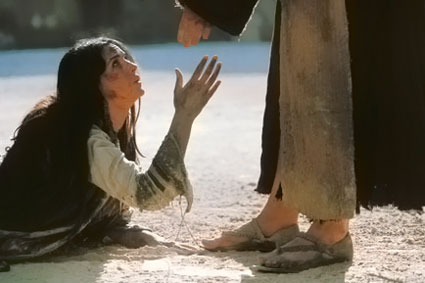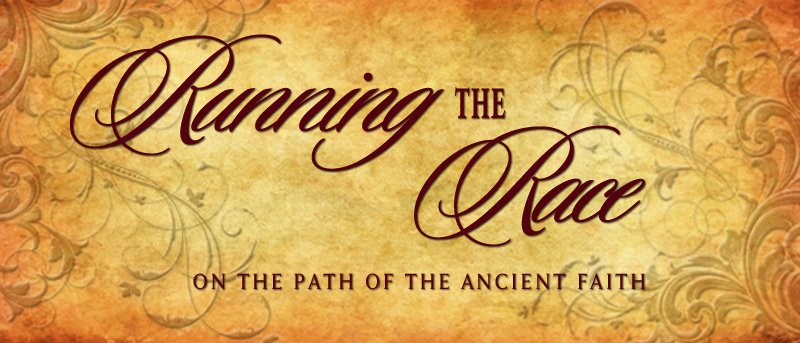Another view of morality and God
 Wednesday, October 26, 2011 at 10:14PM
Wednesday, October 26, 2011 at 10:14PM  I didn't intend to make this a long blog entry (Lord knows my intentions were good); rather, I wanted to share a video that I came across this week (see the end of this post).
I didn't intend to make this a long blog entry (Lord knows my intentions were good); rather, I wanted to share a video that I came across this week (see the end of this post).
The video is a short interview with Archbishop Lazar Puhalo, a retired Eastern Orthodox bishop from All Saints Monastery in British Columbia, Canada. I hadn't heard of him prior to viewing this video, so when I did a little research about him, I discovered that he is somewhat controversial, although I found nothing that opposes Orthodox teaching in this video (which is why I decided to share it). He is a very learned man who has written over 50 books and holds degrees in physics and theology.
In the first half of the video, Archbishop Lazar explains when morality is a heresy. He has written, "Morality can become a heresy because it can become a substitute for a life in Christ. One can begin to fulfill any given moral code and forget about the struggle for the transformation of the inner person, of the heart." This is certainly a very Orthodox understanding in that Orthodoxy offers a therapeutic means of healing us of our passions (which Archbishop Lazar helpfully translates as "sufferings").
In the second half of the interview, he explains how the Western (Protestant) view of God has its roots in scholasticism and Roman law (thus, the development of the doctrine that Christ died in order to satisfy the wrath of an angry God).
In a nutshell, the Western view is that we owe God a debt due to the violation of His honor; it is the debt of broken honor with God that is the problem to solve and fix. God is the one with a problem (the primary antagonist, you might say), in that He cannot forgive us outright, but He must punish someone to satisfy His justice. Christ is the only one who can take it and not be defeated by it, and so He becomes man in order to take our place. Salvation is understood in terms of something other than a relational oneness in Christ, but rather a clearing us from a legal problem.
In Orthodox theology, the two major problems with this understanding are these:
1. God’s forgiveness is not dependant upon repaying a debt, and
2. The debt we owe is not to the Father. Satan is the one who we are in bondage to, not God.
All we have to do to know that the first is not true is look in the Scriptures. All through the Old Testament, before Christ’s sacrifice, God is considered merciful, slow to anger, forgiving all who come to Him. He is ready to cast our sins as far as the east is from the west. The only requirement for forgiveness offered in 2 Chron. 7:14 is “if my people who are called by my name, shall humble themselves and pray, and seek my face and turn from their wicked ways….” Nothing is mentioned about atoning for a past debt before forgiveness of sins can happen. Rather, God simply says: “…then will I hear from heaven, and will forgive their sin and heal their land."
In the New Testament we have the parable where the servant who owes his master more money than he could ever hope to repay is forgiven his entire debt without expectation of repaying it. In the parable of the Prodigal Son, likewise the father takes the son back, not asking that he restore the wealth he lost in sinful living.
As author Frederica Mathewes-Greene writes, "As you can see, there’s no concept that our sins put us in God’s debt legally: No idea that somebody has to pay something before He can forgive us. He just forgives us. When the prodigal son came home, the father was already running toward him with his arms open. He didn’t say, "I’d like to take you back, son, but my hands are tied. Who’s going to pay this Visa bill?"
What is being atoned for is the broken relationship with God, the lack of His life-giving energies, lack of a union with God. We are sick, and need healing because of the corruption we are subject to. In this picture, there is no owing or guilt directly involved, though it is in the background of how we got here. Rather, there is a healing of our souls going on. The analogy of debt and justice totally miss this whole context which is much frequently used in the Church Fathers. Even the Eucharist is referred to as the “medicine of immortality.”
We can see not only why Protestants understand things the way they do in relation to salvation, but why Orthodox understanding is different. It is relational with God, not legal or financial in nature. That changes the whole perspective in how we approach salvation. It is not a one time deal, a declaring “not guilty,” but a continuing relationship with God.
Source: "The Atonement of Jesus Christ" by Timothy Copple
Come, men of discernment, and be filled with wonder! Whose mind is sufficiently wise and marvelous to wonder worthily at the bounty of our Creator? His recompense of sinners is, that instead of a just recompense, He rewards them with resurrection, and instead of those bodies with which they trampled upon His law, He enrobes them with perfect glory and incorruption. That grace whereby we are resurrected after we have sinned is greater than the grace which brought us into being when we were not . . . Where, then, is God's justice, for while we are sinners Christ died for us! -- St. Isaac the Syrian, Homily 60
(One caveat on the video: between segments in the middle, there is a 30-second pause of dead air. Stay tuned or move the slider ahead to hear the second half.)




Reader Comments